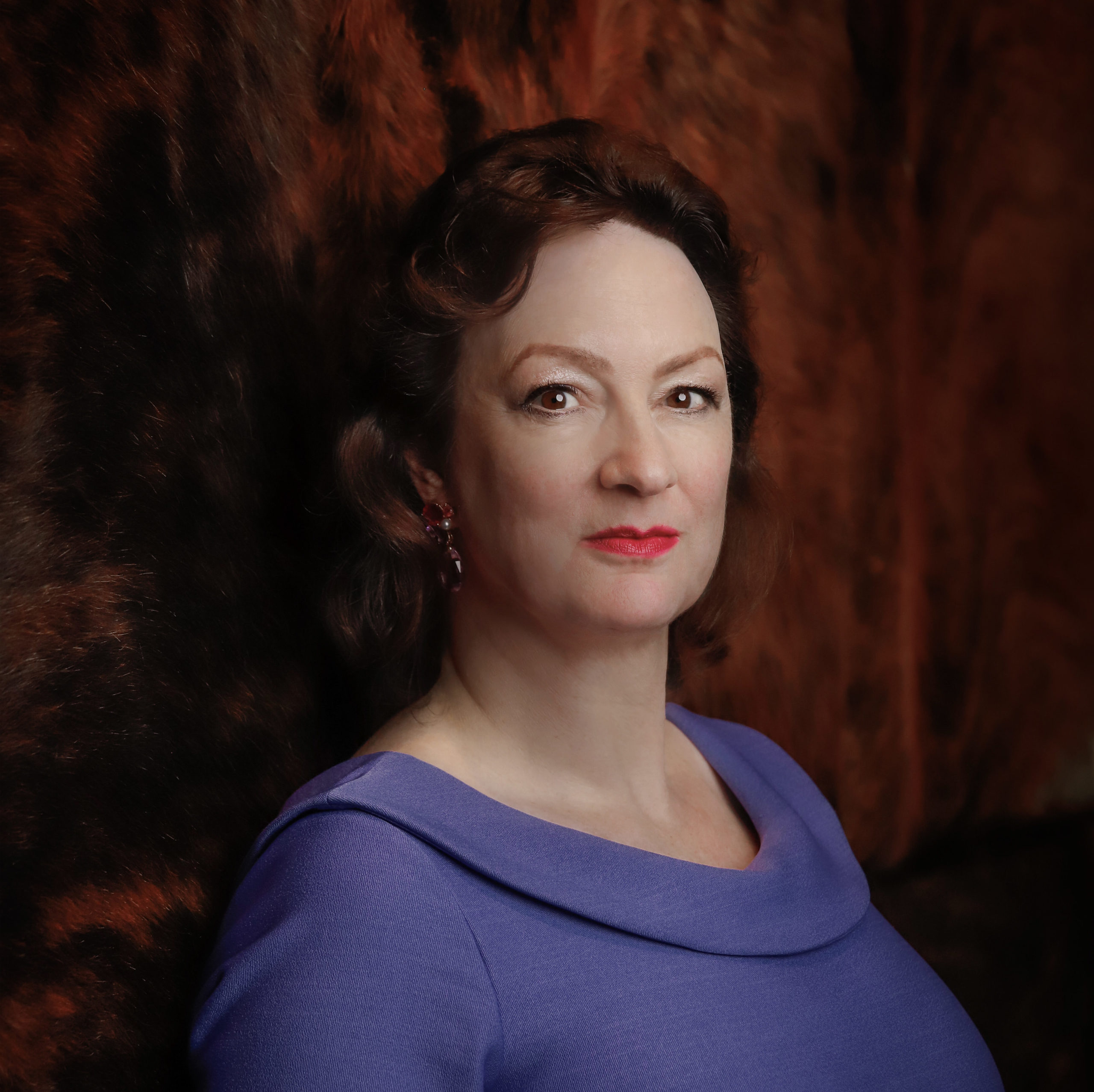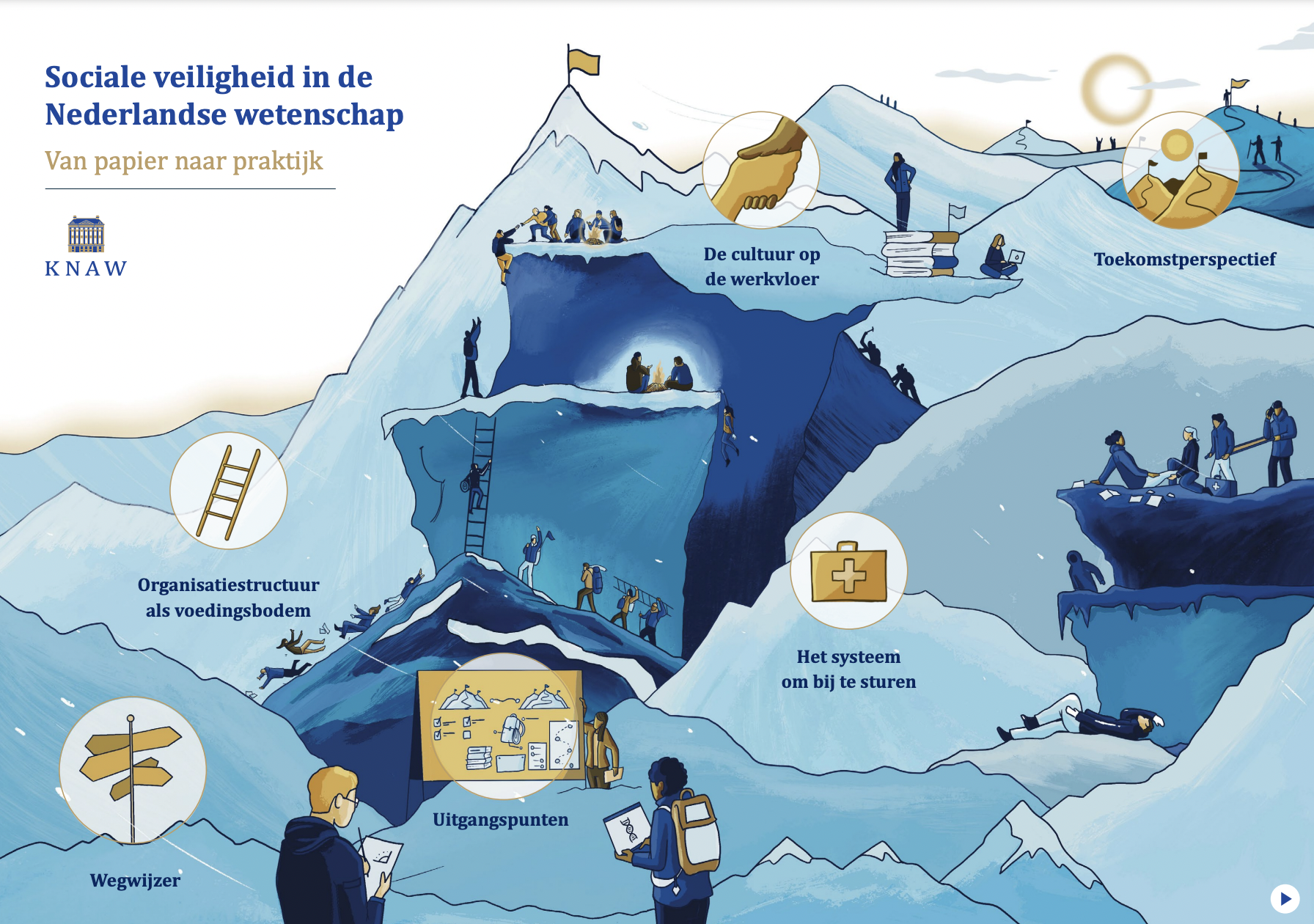Intimidation, discrimination, inappropriate behaviour, bullying and indecent proposals…social safety in science is a sensitive topic. The victims feel they are not being heard, the perpetrators often don’t understand what they did wrong, and witnesses have no idea what to do.
‘There is much awkwardness. People are afraid to do the wrong thing’, says behavioural scientist Naomi Ellemers, a university professor in Utrecht. She heads the KNAW committee that is to advise the cabinet on social safety in the academic world. The committee is determined not to produce the umpteenth paper tiger but instead wrote a practical guide, focusing on social safety, individual experiences and practical tips, including the ‘first aid in the case of incidents’ section. Minister of Education Dijkgraaf was presented with the first copy on Monday.
The KNAW guide stresses that social safety should be a normal topic within the academic world, just like scientific integrity. ‘Various incidents show that academic freedom and integrity are at risk if social safety is an issue’, the publication states. And so, do not wait until things go wrong to address the issue. ‘Fire drills are done before there is a fire.’
What change does the committee expect the report to make?
Ellemers: ‘We offer new insights. Much has been written about the victims in the hope that people will change if they realise a problem exists. That is insufficient, however. Even if those in influential positions value investing in this problem, they often do not know how. We hope to help them get started.’
You have been a part of the academic community for quite some time. Have you experienced unsafe situations?
‘Yes, of course.’
As a victim, bystander or perhaps as a perpetrator?
‘All of the above.’
Do you prefer not to disclose any details?
‘This should not be the topic of conversation. Our recommendations are based on personal experiences, but our main goal is to reveal the structure of these issues and how to solve them. From a behavioural science perspective, there is a lot of information about this topic. Still, people do not think to search for this information. They tend to think: we are all humans; we know how this works.
Is it that difficult to work on social safety?
‘It would seem so. Otherwise, more would be done. The topic is daunting, which is why we tried to minimise the use of the word “must” as much as possible because it has a negative ring to it. It does not inspire you to think: that is something I’m going to work on immediately.’
A personal example can illustrate the urgency of the issue.
‘Well, alright. At the first international conference where I presented my dissertation, a professor told me he considered my research interesting, and he invited me to his hotel room to discuss it further. It was only at the last moment that I realised: this is a bad idea.’
How awful.
She is silent for a while. ‘I felt so stupid. How could I have imagined even for a second that a professor would be interested in my work? That is one of the consequences; it undermines your self-confidence. There are even men who use this tactic to put you in your place: you don’t think we will take you seriously, young lady? At the start of your career, you are insecure and vulnerable.’
I had not considered the impact on self-confidence.
‘Extensive research has been done on this effect. Experiences such as these can even cause women to score lower on IQ tests. It was a long time ago, but talking about it makes me emotional. Almost all female scientists of my generation have similar experiences. They had the choice: abandon science or bury the incident. All those that remained chose the second option.’
There is always the fear of being seen as the bitter bitch who ruins the mood
You mentioned that you also have experience as a witness. What happened?
‘Everyone has been in situations that have you thinking “what happened?” afterwards. Or where you only realise what you could have said after the incident. That is something I get too. But I do remember one incident where I spoke up immediately and was immensely proud of myself. Someone cracked a stupid joke at someone else’s expense, and I commented. Their reaction was a simple ‘okay, so that is something we should not repeat’. No issue. But it is always difficult. There is always the fear of being seen as the bitter bitch who ruins the mood. That is why you should consider how to approach such situations ahead of time. That way, you are better prepared.’
And, you have even been a perpetrator in an unsafe situation?
‘The difficulty is that when you are in a position of power, you literally have a different perspective on reality than those who are dependent on you. This is something that can even be seen in the brain. Thus, you make a completely different impression than you think. I have been told people consider me intimidating, even though I am unaware.’
Can you give an example?
‘One of my PhD candidates worked on a particular analysis for a couple of weeks, which I considered long. ‘Is that what you’ve been working on all this time?’ I asked. I failed to recognise that it was a new analysis requiring much research. And I too am sometimes stressed out, had a bad night or have received bad news of a private nature,’
All in all, are you a good manager?
‘That is precisely the issue; there is no way of knowing. I can’t say I do everything right because everyone makes mistakes. But I encourage people to make me aware of my shortcomings. And they do. That PhD candidate’s other supervisor informed me that my comment was ill-received, so I was able to apologise. You must correct your course actively rather than go with your own gut feeling. I frequently ask my staff: what can I do to help you do your job?’
This KNAW advice does not appear to target people with bad intentions. But they, too, exist.
‘Yes, but perhaps fewer than you think. We spoke to various people who were accused of misconduct, and they were all very emotional. They were shocked, the thought they had done the right thing, had never been told it was a problem and were suddenly prematurely retired.’
But they did exhibit misconduct.
‘Some people have trouble gauging their behaviour, and sometimes, they simply don’t know better. Even managers amongst themselves say things like: You must show anger occasionally, you must keep them insecure, that way they will work harder. But that also makes people stressed and neurotic. These are obsolete views on leadership that I frequently encounter when conducting research at large organisations.’ At a knowledge institute, we are prone to thinking: people are smart enough; this is
At a knowledge institute, we are prone to thinking: people are smart enough; this is not something we need to discuss
How can that be changed?
‘By better preparing managers for their task. At a knowledge institute, we are prone to thinking: people are smart enough; this is not something we need to discuss. We do not consider social skills enough when we hire or promote. Recently, someone told me: ‘I’m not a social worker, am I?’. But the social aspect is important, especially when you are managing a team. So, people should be able to develop those skills.’
On the other hand, some people are extremely sensitive.
‘As a manager, that is difficult to assess. Something trivial can really hit home, and incidents can accumulate. That is why organising social safety and encouraging people to discuss these issues is important. Suppose you have a brilliant oaf, a great scientist with terrible communication skills. You can help such a person by including them in a support system. That may seem inefficient and costly, but consider the hidden costs of young scientists, broken before they could flourish. Or the expense of a legal battle should a complaint be lodged.’
Power imbalance will continue to exist. Does that not mean that problems are inevitable?
‘On the one hand, yes. There are many young, talented people, and only a few gatekeepers decide who is offered opportunities. Those that make it often say: they were really nice to me. But how are those that don’t make the cut treated? If there is an issue, switching jobs is not a solution because you can not avoid the gatekeepers. Almost everyone is highly specialised. You are 30-ish before you are fully specialised, and, ultimately, only a few people in the world are able to see your worth. And, there you have it, you run into the same editor. A letter of recommendation from a leading colleague in your domain can make a big difference. If you want to escape that influence, you must leave the scientific world.’
But on the other hand, there are pitfalls one can avoid?
‘This calls for a structural approach within the organisation. If I explain how power imbalance works, could you avoid any and all issues in the future? No, that is not how it works. If you follow one course on bias, that doesn’t mean that you can objectively assess everyone from that point on.’
Everything you wish to master requires practice?
‘Yes, and updates. New insights come available. That is how we can professionalise further.’
But is discussing social safety with your colleagues for an entire day desirable if you have exams to grade and lack time to do your research?
‘You would rather spend each quarter and every minute on research. I understand. But consider the cost of a problem when things go wrong. That costs so much time and money that there is no other option than prevention. Things may be going well now, but next year, you may get a post-doc with different views in your team, resulting in tensions. Is that the best moment to start considering the issue?’
Are managers motivated for this topic?
‘It is considered a chore. That is something we hear in our talks. You can outsource the problem by acquiring some type of training. But it is important to give thought to what is needed rather than seeing it as just another tedious interruption of the real work. That is not valuable, so we try to avoid that. Addressing this issue takes time but yields results. We are incurring expenses now as well. These expenses include an international researcher who feels ill at ease and decides to seek another job. Do these people lack ambition? Are they unable to settle in? Or are we losing talent because we fail to offer them what they expect?
How can you obviate issues that arise from cultural differences?
‘Ultimately, it is impossible to prevent differences, but you can learn better ways to share insights and perspectives. If you are on the same wavelength, only a few words are required to understand each other. But in an international team, that is not something you can take for granted.’
Is there room for improvement in how complaints are handled?
‘Proper communication and detailing how the complaint will be handled is essential. In the discussions we had, we were often told: It would have made a big difference if the person had apologised. Bad communication makes everything worse. You would think that can easily be prevented, but the value of communication is frequently underestimated.’
Bad communication makes everything worse
You were one of the founders of Athena’s Angels in 2015. Has there been a change in the field of science since then?
‘Sometimes I think much has changed, and sometimes that nothing has changed. I used to think: okay, I am a pioneer. I am the first professor here that is pregnant. Obviously, no thought has been given to maternity leave for professors, and the generation that follows will have it easier. It is disheartening that the same things are still an issue one or two decades further down the line. On the other hand, the fact that this issue is being frequently discussed, also among those in positions of power, is encouraging.’

Naomi Ellemers is a behavioural scientist and is affiliated with Utrecht University as a university professor. She was awarded the Spinoza prize in 2010, the highest Dutch science award. She is one of the four founders of Athena’s Angels, a protest group denouncing sexism in science in the Netherlands.

 Detail from the cover of the KNAW ‘Social Safety in Dutch Science’ guide.
Detail from the cover of the KNAW ‘Social Safety in Dutch Science’ guide. 

